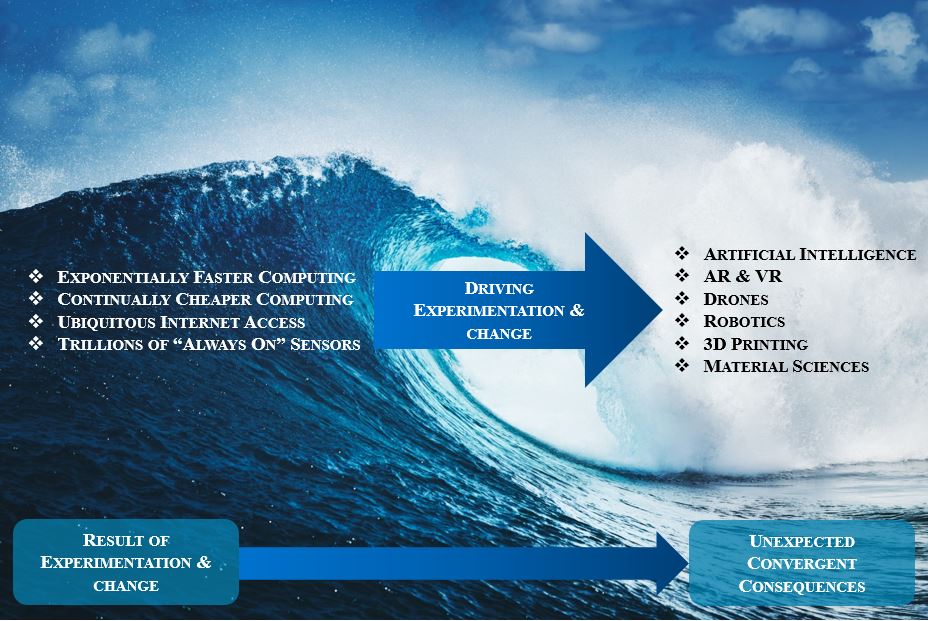“Change has never happened this fast before, and it will never be this slow again”.
Graeme Wood
See, I never intended to write this post. In fact, I’ve been thinking about and writing on a completely different topic (you’ll see), and I really had intended to post that—not this.
But after spending a couple of astonishing days in Los Angeles at a meeting with other Entrepreneur Owner-Managers hosted by Peter Diamandis, my thoughts were bubbling over and needed aeration. I leapt off the elliptical machine, where I was sweating and scribbling on little scraps of paper hanging around the hotel fitness center, spilled my lukewarm coffee in the elevator hustling back to my room, and rushed to jam my thoughts through the keyboard to share these personal insights about the content of our meetings.
The nominal topic for the LA meeting was convergence of technology driving exponential change in our culture. The premise is that the convergence of a handful of driving technology forces reaching a critical part of their acceptance curve today are causing interesting consequences, some unintended. In crayon, I describe the driving forces as exponentially faster computing, coupled with continually cheaper computing, coupled with world-wide ubiquitous internet access, and trillions of “always on” sensors which are resulting in unexpected convergent consequences for our world-wide culture.
 Source: Peter Diamandis / A360, Bigelow LLC
Source: Peter Diamandis / A360, Bigelow LLC
Photo: “Blue Ocean Wave, Epic Surf” by EpicStockMedia, licensed under Shutterstock
What are the exponentially growing emergent technologies from the driving forces?
Artificial Intelligence. AI’s logic and processing leverage will quickly address global society’s most pressing challenges. Rapidly. In a pervasively connected world, commercial incentives will make industrial strength AI ubiquitous, embedding cheap smartness into all that we make. Since everything is connected with everything through ubiquitous sensors and cheap (or free) bandwidth, AI becomes woven into the fabric of our lives, physically and virtually. The value of human data gathering and human number crunching or analysis continues its fall and quickly approaches zero. (An aside, I really think we should term it Artificial Brainpower or Artificial Knowledge, since without Consciousness, it is not Intelligence).
Virtual Reality and Augmented Reality. Where the definition of AR is projecting a digital layer on top of our physical reality e.g. projecting a virtual video “screen” on any physical surface. Major companies like Oculus/FB, Sony, HTC, and Microsoft are launching consumer products (and Apple will roll-out in 2016), but the real action will be in the B2B applications. With wireless headsets and hand controllers, think about how VR/AR will disrupt travel, conferences, manufacturing, and education. For business and education, a lot of things you would have traveled for, you will no longer need to. Will Augmented Reality mean the end of the need for TVs, and computer screens, potentially the end of physical screens of any kind?
Drones. Drones are now part of the consumer mainstream and have gained acceptance in B2B applications like real estate, construction, oil & gas, and agricultural applications. The exponential change in sophistication of smart phone technology enabled drone development. Drone control systems have reached tipping point where they are able to be controlled from smartphones. All major software companies will shortly integrate drone data “reality capture,” e.g. Google Maps and Salesforce.com. In the next couple of years, drone data will surpass satellites in the amount of data gathered and used.
Robotics. Much more pragmatic than Hollywood, robots are in wide use in industry, from well-known firms like Tesla and Amazon (Kiva), but are also ubiquitous in basic applications like printing plants and logistic warehouses. Now robots will benefit by shared “learning in the cloud”, where the experience of one is shared with all and learned. The rapidly decreasing cost coupled with an a-ha moment in the user interface means in the short term they are everywhere, including physically assistive robots for seniors, and neutrally controlled prosthesis.
3D Printing. We are currently able to 3D print in full color and in about 250 materials, many simultaneously (i.e. in the same pass). High speed means not just much faster, but 50X to 100X faster in the next several years. Democratization of means and skills to everyone to make. Printing with conductive inks dematerializes cell phones. In the next few years we will see widespread execution of “adaptive” digital fabrication, e.g. CNC machining, sintering… in effect, a self-learning factory in a box will combine both additive and subtractive manufacturing, in the same value proposition. Why wouldn’t it?
Material Sciences. The material sciences genome initiative means that we can model and predict hundreds of millions of combinations of elements. An example is Perovskite solar cells where it appears they are 30% more efficient and 1000X cheaper than photovoltaic. Not ten years from now, but 15 months from now. AI + Material Science Genome commercializes new materials rapidly.
So here are my Three Big Takeaways from this bricolage of technical brains and brawn:
Exponential Speed. My hurriedly scribbled notes to myself say on several pages: “The vast vast majority of our friends and clients (and certainly the general population) have no idea how fast these changes are coming. Panel experts continually talked about not 15 years, not 5 years, but 18 months.”
Disruption of Your Organization. Be disrupted or disrupt yourself. What parts of this technological convergence will disrupt your organization, your business model, and potentially threaten the Enterprise Value you have worked so hard to build? Are there opportunities for you to disrupt your own business model to use this convergence to become even more valuable to your customers / clients so that they will prefer your product / services? And reward your organization for the value creating outcomes that come from disrupting yourself (increasing your EV and long-term sustainability)?
No One Can Predict the Future. It seems curious to me that any predicted future that is believable by the pop culture is always wrong. And the obverse is also true: any predicted future that is a more probable scenario suggested by the convergence of exponential technology gets dismissed by the pop culture as crazy.
No one predicted that merely by manufacturing 1 billion smart phone chip sets per year (current pace), the accompanying need for sensors in smartphones would drive down the cost and size of those sensors which would then be appropriated by other technologies (in this case drones, robotics, etc), enabling super-fast adoption and future advances quickly. No one predicted that all these incredible advances would be—hear me on this—would be coupled with lower cost. That’s right. No one saw this coming. Yet, almost all of us take for granted the crazy construct that these life-enhancing improvements are coupled with lower cost. Better and cheaper is a helluva lot more life-improving than better and more expensive. (Just think with me for a sec what the world would be like if these advances came with higher cost?)
Precisely because no one can predict anything means that we have unlimited positive possibility for how this technology will be used in the future. And very soon, for the first time in history, every human will be able to be connected to every other human on the planet, for good or for ill.
So The Big Question. For someone who works at the intersection of finance and positive psychology like me, this is all incredibly good news, right? Faster computing plus cheaper computing, coupled with ubiquitous networks and cheap sensors everywhere means there will be an availability of data, along with the processing power of AI to analyze it, the likes of which we have never seen before. In the next couple of years, we will correlate previously uncorrelated data from sensors, web, drones, email, tweets, etc. Think fondly about the memory of (your disappearing) personal privacy, it’s long departed.
For all of human history, we humans have had to focus individually and collectively mostly on things that arguably, machines can do better than we can. Generally any task that can be measured by the metrics of productivity—output per hour—is a task we want automation to do. In short, productivity is for robots, and boy is our productivity (GDP) about to shoot up.
Yet much (most?) of the general population’s and talking heads’ discussion around technology convergence has been fear based, trying to think about where the jobs are going to be by asking what jobs will machines not be able to do.
That’s the wrong question.
Humans excel at experimenting, playing, creating, and exploring. Yet our notions of jobs, of work, of the economy up to now have not been allowed to include a lot of space for day dreaming, experimenting, playing, creating, and exploring. We have had to mine the data. Farm the data. Analyze the data. Act like machines.
For the first time in the history of the world we are now able to focus on and ask the right question: what are the strengths we have that are uniquely human, and how do we build on those? Not fixing or improving on our weaknesses—but truly to build on our strengths. Not the ones that we’re good at, or not that we are excellent at, but on those strengths that only as humans we are uniquely suited to act on. Whether it is active listening, appreciative inquiry, empathy, love, generosity, relating, connecting, encouragement… we can be the first group in the history of the world to not only recognize our uniquely human strengths, but even to turn them into unfair advantage against cynics, simulators, takers, non-believers.
You know how on an airliner they (used to) say if you need oxygen, put on your own mask first so that you can help others? Well, if we are to bring massive value, then we as EOMs we have to dig down and mine our own unique human consciousness first, so then we can help others.
Whether you call it Flow, PHI, Edge, Alpha, Distinctive Competence, Unique Ability, how do we inspire more conversation on this newly arriving era where we are being set free to build and act on our strengths?
Here’s a curious unintended consequence (at least for me). The technology convergence and resulting possible focus on PHI is causing an interesting feeling for me. I have never felt more optimistic about the future than I do right now.
There is something very civilized about holding a creative conversation in a location where lemon trees grow outside in January.
One of the great side benefits of bringing together a group of only EOMs is that for most of us, being an independent critical thinker means you never feel the warmth of the popular culture majority simply because you don’t agree with the pop culture majority. Bringing together a group of high energy EOMs all hungry for learning reminds us that we are all cells in the same body.

